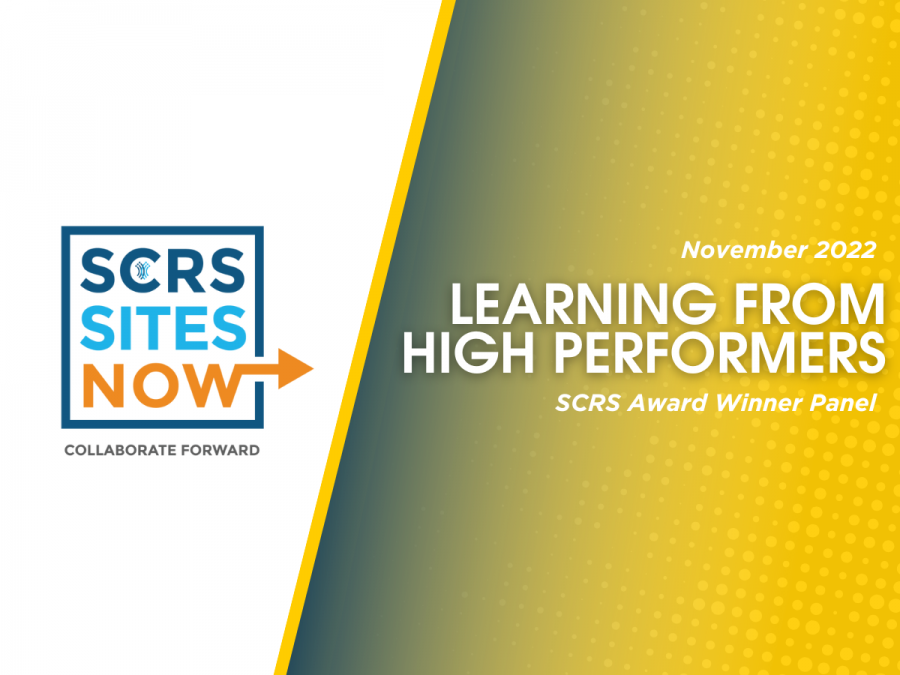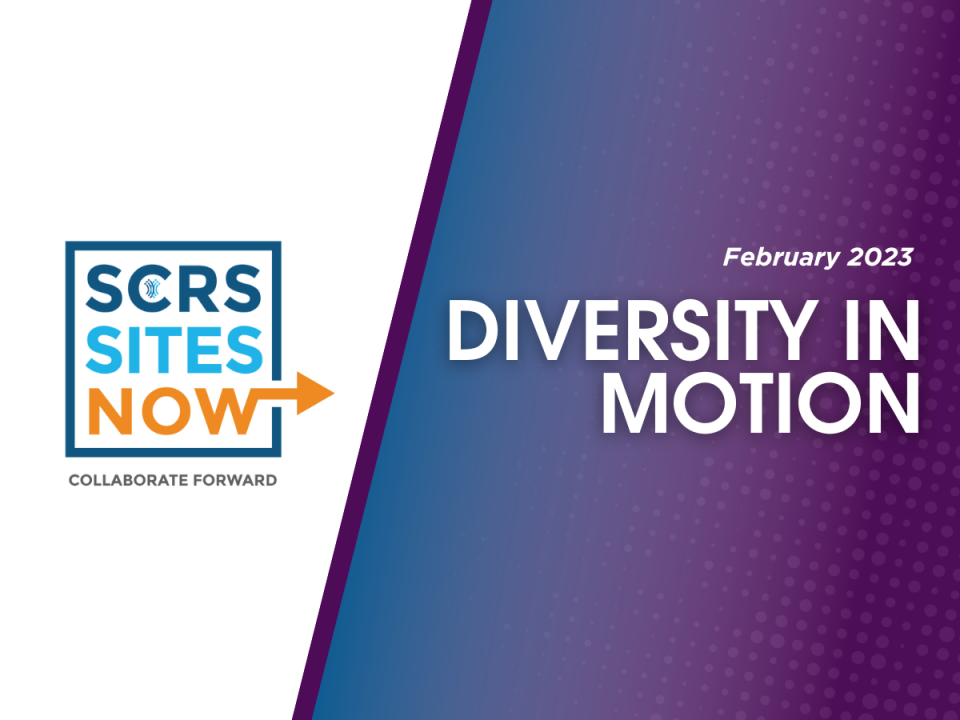Learning from High Performers: 2022 Award Winner Panel

In October, SCRS came together with more than 1,200 clinical research professionals at the Global Site Solutions Summit to commemorate 10 years of advancing site success. We also celebrated forward-thinking organizations creating innovative solutions and partnerships advancing the clinical trials industry. In the November Sites NOW discussion, 2022 SCRS award recipients highlighted the initiatives and strategies that helped them stand out and earn well-deserved recognition.
Putting patients at the center
In 2021, DM Clinical Research decided to implement data-driven decisions to enrich the patient journey. Patient-focused practices were already a core value of this year’s Excellence in Patient Centricity award recipient, DM Clinical Research, but they wanted to take that value a step further by making it a strategic goal. Hera Arham, Director of Marketing & Patient Engagement at DM Clinical Research, shared that they first worked to identify roadblocks and pain points their patients experienced. Through a sophisticated tracking system, they created an internal dashboard to identify issues at each site with the goal of changing staff behaviors to be more mindful of the patient experience.
“Using data to operationalize patient centricity is the key,” said Arham. “How do we innovate to become a patient-centric company if we don’t have the data and tools?” DM Clinical then created a dedicated patient engagement team that was responsible for assessing, improving, monitoring and reporting on the end-to-end patient experience.
Additionally, DM Clinical established an additional customer support team to manage real-time calls for all patient inquiries. This team answered questions ranging from transportation to the clinics, trial compensation, communication with staff, and even eDiary or compliance issues. Within the first six months, the dedicated team answered more than 17,000 phone calls that would have been missed and resolved 1,000+ patient issues in real time.
Gathering patient feedback was also critical for DM Clinical. Patient input was collected through a combination of automated surveys and spot-individual interviews after each interaction. This allowed unfiltered contact with patients that were enrolled or considering enrolling.
Scorecards were created for each site that measured Google reviews, focus group data, and survey data. The scorecards were reviewed by both site and leadership teams to determine solutions needed for improvement. Patient retention and referrals increased after implementing these practices.
“Our shared-decision making helped us create a more patient-centric approach to identifying common trends and unique situations that impacted the way participants perceived research, DM Clinical, and medicine in general. We knew changing the culture within an organization to be more patient-centric meant that we’d need to support the change through reliable metrics and KPIs. Real data helps identify blind spots and track progressive improvement. At DM Clinical, we knew one thing to be true – we all needed to become patient advocates,” said Arham.
Moving the needle in diverse community outreach and recruitment
Javara, recipient of the Site Patient Recruitment Innovation Award (SPRIA), developed a recruitment plan to reach a variety of patients through different mediums, including social media advertising, doctor-to-patient email marketing, direct mail and newspaper ads. “Innovation isn’t just technology; it’s about taking existing processes and making them better,” shared Mike Clay, Chief Operating Officer at Javara.
The recruitment efforts prioritized community engagement and human interaction. They worked with the non-profit organization Greater Gift to support this component. Greater Gift’s mission is to increase awareness of clinical research, especially among underrepresented communities. This partnership allowed Javara to develop relationships within diverse communities.
By developing relationships and cultivating a community before recruitment efforts, the patient population was more receptive and in turn, Javara and SouthCoast Health were able to exceed enrollment for this study and increase diverse patient participation.
Increasing the clinical research talent pool
As we learned in the August 2022 Sites NOW discussion, there is a significant gap between the number of jobs available for clinical research coordinators (CRCs) and the number of qualified staff to fill those positions. To address this, Site Tank Award recipient UC Davis Health School of Medicine – Clinical and Translational Science Center (CTSC) developed a program to train the next generation of clinical research staff in 16 weeks.
In collaboration with local community colleges, Medix, and UC Davis Health’s Diversity and Inclusion program, a pilot training program was launched to address the persistent shortage of CRCs and increase diversity of the clinical research workforce. The comprehensive training program also opened a pipeline to STEM careers for people historically underrepresented in these fields. Stipends, internships and shadowing opportunities were provided.
This was the first comprehensive CRC training program administered by a public-private partnership. The program was unique in that it offered a combination of classroom learning with workplace exposure to clinical research processes. After completing the training, Medix helped place the clinical research coordinators in open roles with UC Davis or other organizations. UC Davis plans to expand the program by collaborating with more colleges and organizations nationwide.
Site-centricity from the CRO perspective
As the 2021 and 2022 recipient of the Eagle Award, PPD, part of Thermo Fisher Scientific, has been prioritizing site-focused approaches to everything they do. A more recent initiative by PPD has focused on improving training for sites that are new to clinical research and help those sites gain experience to earn more trials.
As more sites adopt decentralized elements in their trials, PPD actively requests feedback from sites on how to make DCTs better overall and acts on that feedback. Diversity is another critical need for the industry that PPD is prioritizing. For diversity efforts, they have been working with sites to determine their needs for better diverse enrollment and developing programs to adapt to those needs.
What can sites do to stand out and be noticed by CROs? Lisa Dyment, Senior Director of Site Collaborations at PPD, part of Thermo Fisher Scientific, encourages open dialogue and staying in close contact with the sponsor and CRO. “Have open dialogue with your points of contact at the sponsor and CRO. Be very honest about your enrollment objectives and what you can realistically achieve. Give feedback. Let us know what you like and don’t like about the study and challenges you might be facing. As an intermediary, we may not always have the power to make changes in a study, but we can definitely commit to passing the message along,” added Dyment.
Establishing consistency at the sponsor level
After the world was turned upside down from the pandemic, 2022 Eagle Award recipient Merck decided to get back to basics, working to analyze and understand the areas where sites needed support the most. Merck asked their sites about their pain points and then developed a strategy to step up to those needs.
Sites have consistently asked for single points of contact for both CROs and sponsors, and Merck delivered in an especially critical area: budgeting and contracts. Merck appointed one person to negotiate budgets and contracts with each site, so that sites would only have to communicate with one person.
Another initiative kept CRAs at the same sites to establish relationship, cadence and familiarity. Additionally, Merck created a dedicated, real-time technology support team to help sites with onboarding and implementing new technologies.
Amplifying the voice of the sites
Viviënne van de Walle, the Christine K. Pierre Site Impact Award winner, has been a huge advocate for SCRS and clinical research sites for decades. As an SCRS Leadership Council Member and European Site Solutions Summit chair, she is a remarkable leader and voice for sites around the world.
Improving lives of patients is at the heart of Viviënne’s work, and improving processes at sites and throughout every stage of clinical research is a large part of that. Vivienne shared that clinical research stakeholders are understanding each other’s sides of the story by coming together often and communicating openly through mediums like Site Advocacy Groups, online and in-person events, and the SCRS online community.
Congratulations again to all of the 2022 award recipients and finalists! Learn more about each award at sitesolutionssummit.com.
Watch the replay of the Sites NOW discussion here:



